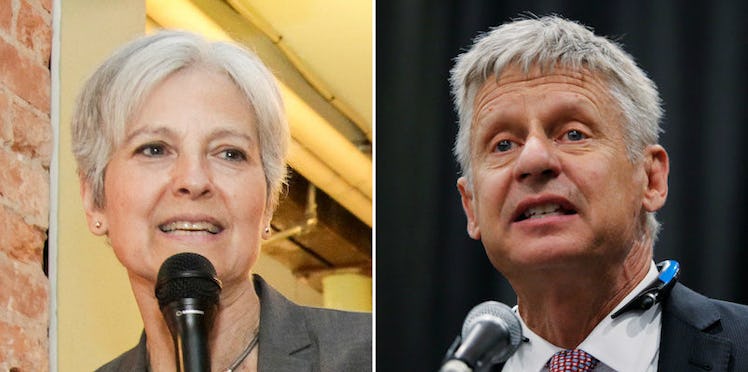
This Is How Third-Party Candidates Hugely Impact Elections Even When They Lose
With the controversy that marred the beginning of the Democratic National Convention and the circus-like atmosphere that was the Republican National Convention, many American voters are left feeling like their voices will not be heard at the ballot box in November.
The aftermath of the email leak that showed a pro-Hillary Clinton bias caused the DNC's chairwoman, Debbie Wasserman Schultz, to announce she was stepping down right before the start of the convention.
The revelation left manya Democrats with a bad taste in their mouths. Bernie Sanders' supporters showed up in numbers to show support for the candidate they believe had the election stolen from him.
The "Bernie or bust" division within the Democratic Party may prove to be an obstacle in defeating Donald Trump. The first day of the DNC stressed the sentiment that the party needed to unify. However, some people just weren't buying it.
Elections have long been described as an exercise in picking the lesser of two evils. But this year, that sentiment is stronger than ever before.
A movement artfully named “Demexit” (in reference to the Brexit vote, in which the the United Kingdom left the European Union) has been talked about online.
Many Democrats (and Republicans alike) are running for the hills of a third-party candidate: Jill Stein of the Green Party or Gary Johnson of the Libertarian Party.
A number of protestors outside the DNC held signs that read “Jill Not Hill” and “I'm not with her.” Stein offers safe haven to the progressive movement that refuses to buy into a Clinton presidency.
Stein and the Green Party seek to transition to 100 percent clean, renewable energy by 2030, create living-wage jobs for every American, abolish student debt, expand women's rights, protect the LGBTQ+ community and end police brutality, just to name a few.
So, it's easy to see why distraught Bernie supporters look to Stein for hope.
Johnson, on the other hand, was a member of the Republican Party until late 2011 when he made the switch to Libertarian.
The Libertarian Party believes in civil liberty, non-interventionism, laissez-faire economics and the abolition of the welfare state.
Generally, the party falls somewhere between culturally liberal and fiscally conservative. This makes Johnson a viable choice for members of both parties who fall more toward the middle of the political spectrum.
Even so, third-party candidates have never won a race to the White House, something seen as nearly impossible in the US electoral system.
Except for a few states, the winner-take-all system in most US states bolsters two parties and often blocks a third party from representation. That basically means a third party can win a sizable chunk of the vote in a district and still walk away with nothing.
So not only does the electoral system work against a third-party candidate, but so do the opinions of the American people.
According to Newsweek, Americans are actually becoming more polarized, with Democrats becoming more diverse, urban-based and less religious and Republicans becoming less diverse, more rural and more religious.
It is this polarization that makes us all want to ensure our parties' candidates win elections, even when we consider them the lesser of two evils and not necessarily the best people for the job.
In addition to the system itself and the polarization of citizens, another fatal flaw for third-party candidates is the lack of media airtime these alternative choices receive. Oftentimes, these candidates are barred from on-air debates and thus not given the platform to express their views and proposals to the masses.
However, in spite of these challenges, the political climate of the 2016 US presidential election could empower third-party candidates in a huge way.
Consider the fact that third-party candidates have previously influenced the final results of elections. For example, some believe third-party candidate Ralph Nader pulled enough votes, especially in the state of Florida, from Al Gore to sway the 2000 presidential election in favor of George W. Bush.
In fact, according to Fortune, there are many examples of third-party candidates upending the system. In 1912, former president Theodore Roosevelt ran as the nominee of the Bull Moose Party.
By being on the ballot, Roosevelt cinched the victory for Democratic candidate Woodrow Wilson by splitting the Republican vote with incumbent president, William Howard Taft. Taft likely would have been re-elected had there not been a third party.
Consider this, too: Imagine a scenario in which neither party wins enough electoral votes to lock in the presidency.
In such a turn of events, the House of Representatives must then select the president, as directed by the Constitution. Depending on the House majority, the third-party president could, in theory, become president.
Both Stein and Johnson have a chance to make a substantial impact on the outcome of the presidential race by drawing enough votes away from the Democratic and/or Republican candidates; Stein could seize votes from the Clinton camp, which could make the Green Party the deciding factor in states like Florida and New Hampshire.
The presence of Johnson may actually give Donald Trump the upper hand in Ohio and Pennsylvania since polls show the Libertarian candidate pulling more votes from Clinton.
In any case, only time will tell what effects Stein and Johnson will have on the 2016 election. But no matter the effects on the election they have, the question remains: Are we all ready to handle the fallout?
Citations: WHY THIRD-PARTY CANDIDATES ARE DOOMED—AT LEAST THIS YEAR (Newsweek), What Voters' Frustrations Mean for Third-Party Candidates (Fortune), How a Third-Party Candidate Could Cause an Electoral Crisis (Huffington Post)